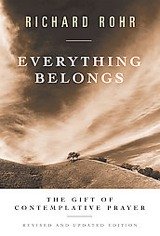Lectio Divina is Reading With God
The practice of spiritual reading, or Lectio Divina, teaches us to allow God to shape us as we're reading the bible or other sacred text. It teaches us how to make our lives a part of the larger story or narrative of the text, instead of trying to make the text a part of our lives.
My whole life is about loving God, and about encouraging and helping other people to find and love God. Sometimes the starting point for this journey is just sitting down and reading the bible. It started there for me, so it's also the first topic of discussion on NeoMysticism.com.
 Lectio Divina
Lectio Divina
I believe that the bible is God's Word, and a source of God's revelation to us. You may or may not agree with me. However, without God's revelation we can't hope to make any progress on our spiritual journey to grow in love for Him. I don't believe the bible is the only or exclusive source of God's revelation — implying that would be placing God in a box again. And He's too big for our boxes...
There's a problem with the way we approach our reading. People don't always read the bible with the right attitude, awareness and motivation. Also, we sometimes come to the bible from our vantage point in life, not open to anything that would threaten that vantage point.
As the loving God's revelation to humanity, the bible should be read on God's terms. We should read the bible so that it shapes our lives. Our reading has to be translated into living, but the two shouldn't be detached from each other. Eugene Peterson illustrates this wonderfully in Eat this book. I suggest you read that work as you make this ancient practice part of your life.
Please note...
If you're from a tradition or religion other than Christianity, you can easily apply what is taught here with regard to the bible, to read a text that is sacred to you.
Instead of trying to fit the bible somewhere into our lives, we should see the bible as a book pointing to a Grand Story, one going on all around us. We should aim to see how our lives fit into this Grand Narrative of the bible. We should view the bible not as a collection of verses we can use to prove our point, but as a sweeping story of a loving Creator who's placed a deep desire for Him deep in every human heart. We should allow the bible to study us, and use the bible to study ourselves...
Mostly, instead of practicing this healthy way of reading, we approach the bible with the lenses we received from our churches, our culture, and our own ideas. These lenses are dirty and only allow us to search for and seek out those verses that re-enforce our way of thinking and living. This isn't faith, but knowledge, and thus leaves no room for healthy doubt and the important practice of wrestling with the text.
We also tend to identify with Jesus in his stories, and not with those who Jesus are speaking to, correcting, or teaching. We think we 'belong' so all we do with His teaching is apply it to others to point out their mistakes. This way of working with the bible isn't just harmful... it's deadly. And we have enough dirty spots on the timeline of the church and humanity to prove that... (think crusades, inquisition, the Ku Klux Klan, the Nazis, and Apartheid — to name but a few).
Regaining that which was lost...
Those who have gone before us employed a practice to read the bible that has until a decade or two ago been lost to this generation. It's called...
Lectio Divina
... and means divine reading, spiritual reading, or reading with God.
Lectio Divina was used throughout the ages as a very fruitful way of reading and praying the bible without exposing yourself to your own harmful incorrect ways of interpreting and thinking. It started coming into practice at about the same time as monasticism (before 500 ad.), but the division of the practice into the four steps (which we'll get to shortly) dates back only to the 12th century.
"The Word of God is not received by faith when it flits about in
the top of the brain, but when it takes root in the depth of
the heart."
— John Calvin
In her very useful little book on Lectio Divina, Too Deep for Words, Thelma Hall points out that monasteries were considered places where spirituality was practiced and taught to those on the outside. Thus, both monastics and non-monastics practiced this form of reading and praying. Everyone didn't have a copy of the bible in those days, so it was mainly practiced in groups, initially.
The use of Lectio Divina sadly started declining in the 16th century and made way for more intellectual forms of prayer. Shortly thereafter people even began thinking of contemplative practices such as Lectio Divina as unbiblical and untrue.
However, we must remember what Jesus promised in John 14:26: "The Friend, the Holy Spirit whom the Father will send at my request, will make everything plain to you" (The Message). Clearly our ancestors in the faith were being led by the Holy Spirit as Jesus promised them they would be, and promises us we'll be. If the Holy Spirit revealed certain practices and disciplines helpful for spiritual transformation and progress of earlier followers, then we should sit up and listen.
The experience and fruit that our spiritual forebears received from the faithful practice of Lectio Divina gives us good reason to learn from them and make progress in our pursuit to attain the highest goal of our spiritual journey, namely divine union or union with God.
Another blockage to the widespread practice of Lectio Divina, and the contemplation it leads to by ordinary followers of Jesus and others, is that it has been thought of incorrectly at times as the exclusive right and privilege of some with a 'higher calling' on their lives, eg. the monastics. This is simply not true if you consider the earliest practice of this discipline included both lay people and those who considered it their calling to seek and serve God full-time.
Why is it that this practice and the form of prayer that accompanies it got lost then? We don't have that answer, but we have the opportunity to right the wrong of neglecting Lectio Divina for spiritual growth.
The Four Steps of Lectio Divina
The four steps of Lectio Divina are:
- Lectio (Reading) — Here the aim is to get thorough exposure to the text. You read a wider passage, and zoom in on the part you decide to concentrate on (by reading and rereading it). It's also wise to read the focus area out loud in order to hear it, and to truly listen to the words.
- Meditatio (Thinking) — With Meditatio your goal is to engage your intellect. One of the concerns of the spiritual life is to gain freedom from obsessive thinking, but although thinking doesn't define you it's still necessary for higher levels of awareness and/or consciousness. This is where you think about what you read and (where possible) use your imagination to become part of the narrative of the text.
- Oratio (Praying) — This is where you share your thoughts and observations with God. You could also incorporate other prayer practices here, but it's important that you learn to simply be honest and open with God and to share what you experienced, including your struggles or doubts. Also leave time to wait on and listen to any response from God...
- Contemplatio (Contemplation) — This is the step that involves practicing a higher level of consciousness of God through silent prayer. You don't say anything, and you try to clear your mind of all thoughts. It's hard work, but it's also widely recognized as the most important spiritual discipline for transformation and overcoming the false self.
Sometimes a fifth step is added in the form of Operatio (Acting). This would involve living out what you became aware of in your practice of the first four steps, something that I believe will be a natural consequence of well-practiced Lectio Divina.
Spend some serious and patient time in this section to get used to this alternative way of bible study. Lectio Divina is both a healthy, necessary way of reading with God, and an introduction to the crucial practice of
Contemplative Prayer, to which we'll turn our attention next.
A Suitable Quote...
"How do you make attractive that which is not?
How do you sell emptiness, vulnerability and nonsuccess?
How do you talk descent when everything is about ascent?
How can you possibly market letting-go in a capitalist culture?
How do you present Jesus to a Promethean mind?
How do you talk about dying to a church trying to appear perfect?
This is not going to work (admitting this might be my first step)"
— Richard Rohr at the beginning of his book Everything Belongs...



